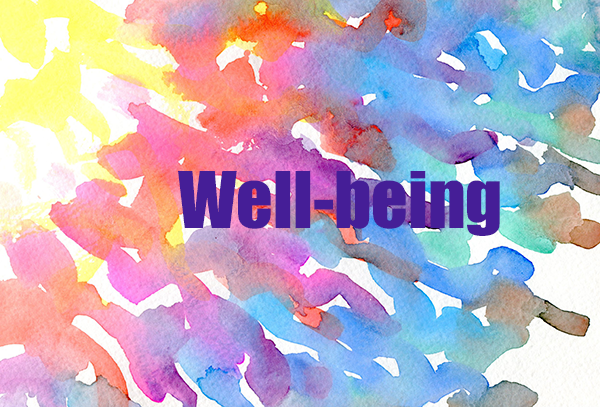Well-being is feeling strong and calm, full of purpose and vitality. We can look at it through physical, mental, emotional, and spiritual lenses.
I get into trouble, though, when I look at an ideal, consider my reality, and judge myself as lacking. How can I be kind to myself while I cultivate well-being? If I understand well-being as a set of skills and look for simple practices that teach me those skills, then I feel resourceful and resilient, rather than impoverished and overwhelmed.
What are the skills of well-being?
Physical Well-Being , according to Independence Blue Cross, includes getting enough sleep, water, and exercise and eating nutritious food.
Mental well-being, according to Richard Davidson, includes awareness, connection, insight, and purpose.
Emotional well-being (again, I turn to the folks at IBX) includes identifying, expressing, and responding to our emotions.
Spiritual well-being, according to the MS Society, includes identifying what drains and sustains you, getting your priorities in order, connecting with your inner self, building spirituality into your life, and maintaining balance in your relationships.
That list can still be overwhelming. I find it helpful to think in terms of practices rather than habits. Practices breaks down a behavior into achievable small bits. My goal is to repeat them patiently and persistently to build experience. It’s not up to me to be perfect. Instead, I strive for consistency. If I mess up, my job is to forgive myself and try again.
Your journal can help you explore the issues and create a compassionate, skillful practice plan. Here are some prompts to play with.
After reading the list of well-being skills, which phrase attracts you? Which repels you?
Write a paragraph that begins: “when it comes to my well-being, I…”
Choose one area that attracts you, click on it, and do some reading. Again, notice phrases or skills that attract and intrigue you and write a paragraph in response.
Looking at your writing, choose ONE skill you would like to develop or improve. What might you do? Think tiny and daily (“I will go to bed before 10 PM each day.”). Might this be an opportunity to make a kind promise for yourself? The format I have found helpful is “I will [verb]
.” What will you do? In what spirit will you do it? For example, “I will share strengths compassionately. “Write the promise and post it somewhere you will see it several times a day. The refrigerator door or bathroom mirror are good places for reminders. Schedule a few minutes every day to learn about and practice your chosen skill.
At the end of the month, take stock. How are things going? How do you feel about your choice to improve this skill? If you’ve done what you set out to do, congratulate yourself, celebrate! If you haven’t done what you meant to do, you can forgive yourself, recommit and return to skill Improvement OR you can forgive yourself and make a new choice. No guilt, shame, or punishment is required. Remember, the goal is to be kind to yourself.
May you be well and live with joy.

